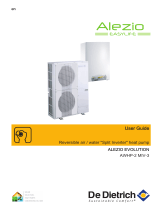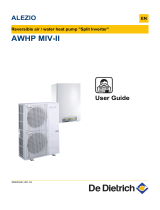
8
SAFETY INSTRUCTIONS
ENGLISH
- There is risk of fire or electric shock.
• Do not touch any electric part with wet hands. you should be cut power
before touching electric part.
- There is risk of electric shock or fire.
• Do not touch refrigerant pipe and water pipe or any internal parts while the
unit is operating or immediately after operation.
- There is risk of burns or frostbite, personal injury.
• If you touch the pipe or internal parts, you should be wear protection or
wait time to return to normal temperature.
- Otherwise , it may cause burns or frostbite, personal injury.
• Do not touch leaked refrigerant directly.
- There is risk of frostbite.
• Make sure to install mixing valve (field supply). The mixing valve is setting
the water temperature. The hot water temperature maximum values shall
be selected according to the applicable legislation.
• Do not heated to a temperature of more than provided by the product.
- Otherwise, it may cause fire or damage of product.
• This appliance is intended to be used by expert or trained users in shops, in
light industry and on farms, or for commercial use by lay persons.
• Do not step on the unit and do not put anything on it.
It may cause an injury through dropping of the unit or falling down.
•
When flammable gas leaks, turn off the gas and and open a window for ventilation
before turn the product on. Do not use the telephone or turn switches on or off.
- There is risk of explosion or fire.
• Use a vacuum pump or Inert (nitrogen) gas when doing leakage test or air
purge. Do not compress air or Oxygen and Do not use Flammable gases.
Otherwise, it may cause fire or explosion.
- There is the risk of death, injury, fire or explosion.
• The appliance shall be stored in a well-ventilated area where the room size
corresponds to the room area as specified for operation.
• The appliance shall be stored in a room without continuously operating
open flames (for example an operating gas appliance) and ignition sources
(for example an operating electric heater).
• The appliance shall be stored so as to prevent mechanical damage from
occurring.
•
Any person who is involved with working on or breaking into a refrigerant circuit
should hold a current valid certificate from an industry-accredited assessment
authority, which authorises their competence to handle refrigerants safely in
accordance with an industry recognised assessment specification.























